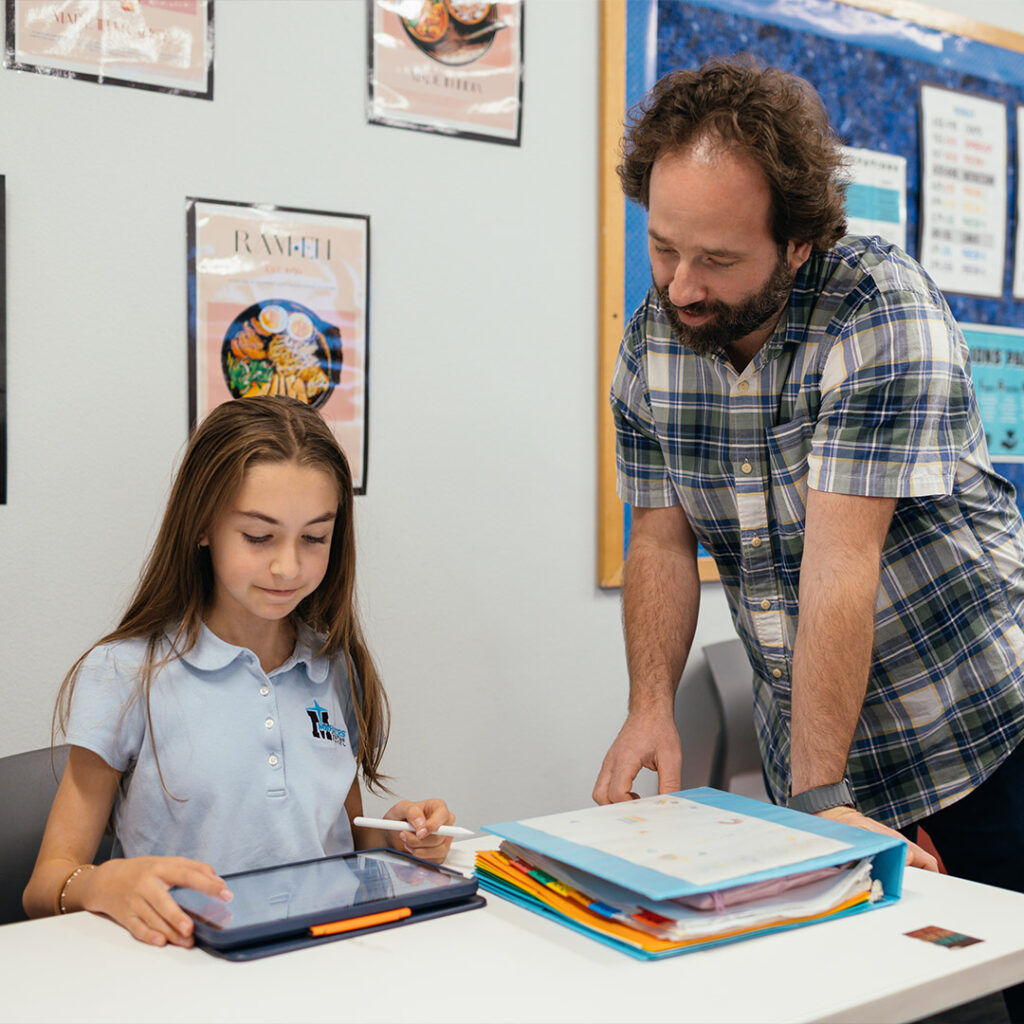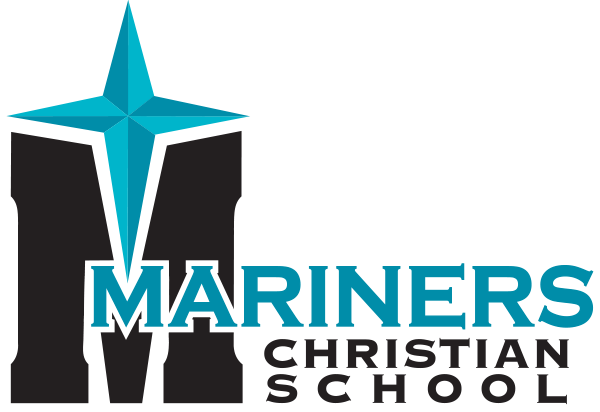Middle School
Mariners Christian School’s Middle School is an extraordinary program that maintains exemplary academics in a Christ-honoring environment. Focused on the whole-child, a broad range of educational experiences are offered which appeal to varied interests, talents, and passions including electives, enrichments, athletics, service and ministry opportunities, clubs, leadership development, and course offerings.
Combined with rigorous academics and expansive program offerings, the spiritual growth of all students is prioritized developing authentic faith and a deepening love for Christ. At the culmination of the middle school years, students are prepared for future success, equipped with a biblical worldview, thriving in their gifts and talents, and trained as difference makers for His Kingdom.
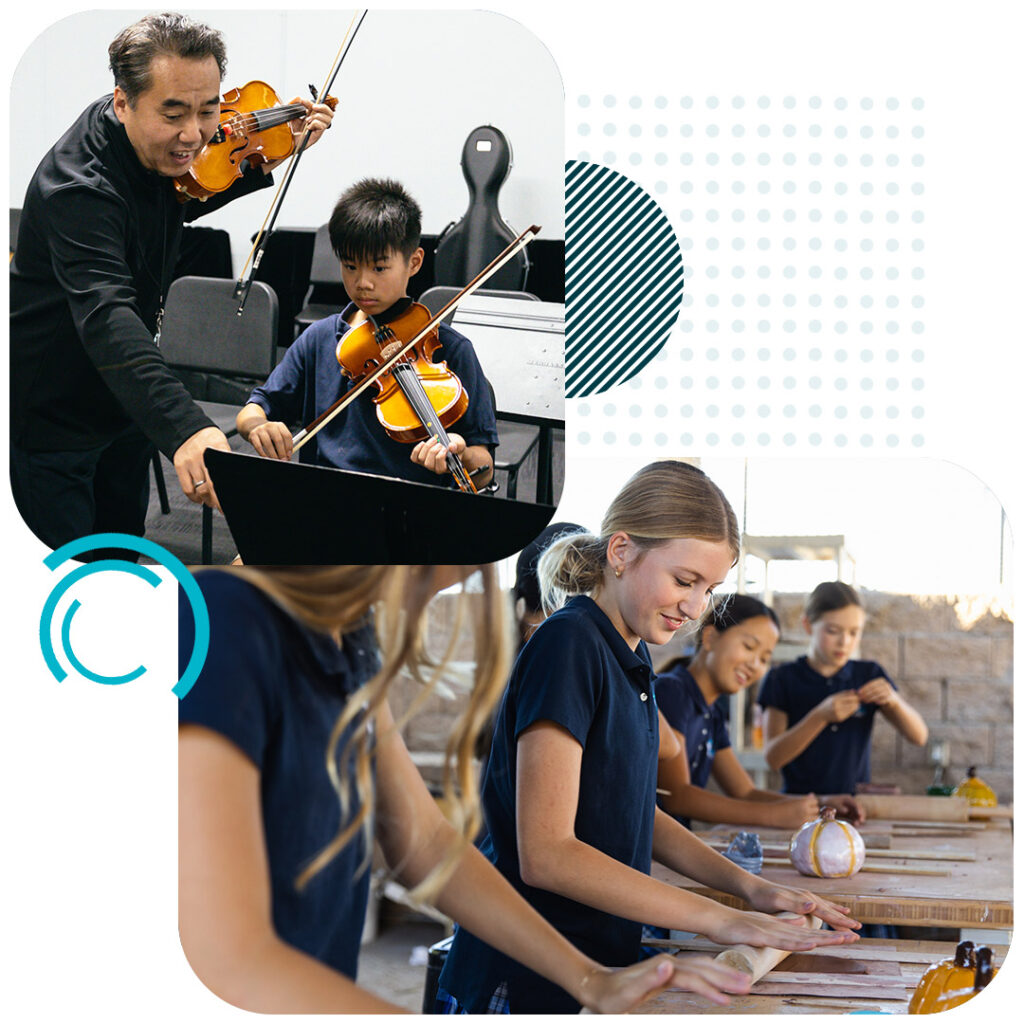
Distinctive Middle School Characteristics
- Learning environment dedicated to honoring God and others maintaining the highest of standards
- Vibrant community purposed to build strong relationships and provide an active student life through multiple social events and activities
- Purposeful spiritual formation including weekly chapel program, Christian Apologetics and Bible Program, biblical worldview integration across every subject, and intentional discipleship of every student
- Dedication to building content mastery within and across each subject
- Extending learning to develop “Scholars of the Discipline” through identified habits, practices, skills unique to each content area
- Focus on critical thinking skills to ensure students learn to think, communicate, analyze, apply, and transfer knowledge
- Variety of academic course offerings designed to meet needs of all learners from honors courses to intervention and support
- Mariners Institute of the Arts offering distinct opportunities in visual and performing arts
- Comprehensive Athletics Program
- Development of student leadership through Associated Student Body, Peer Assistance Leadership, Student Ministries Team, Student Worship Leaders, and multi-grade level small groups.
- Grade Level Experiential Week with 6th grade attending outdoor science camp, 7th grade participating in Heart to Serve Days and the 8th grade trip to Washington, DC.
- Commitment to supporting personal growth and development of every student
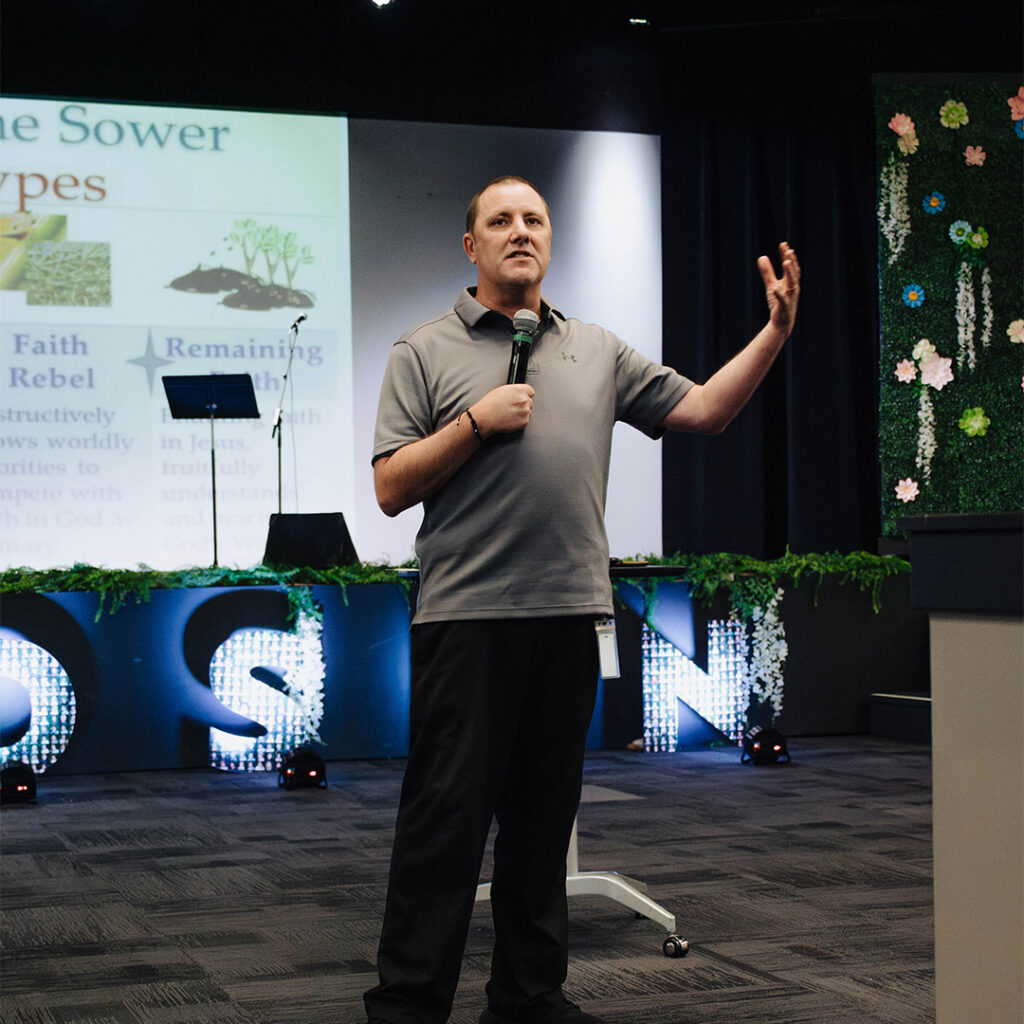
Bible
We develop theologians, disciples, and apologists who are able to study the Bible, walk in the Spirit daily, defend Truth, and confront controversial cultural issues from a biblical perspective. Students learn to be theologians, with the ability to analyze biblical text to understand the meaning and application of a passage to their lives. Students learn to be disciples, developing habits and skills to be sensitive to the Holy Spirit in applying and living out the meaning of the passage to their lives. These habits and skills will help students abide in Christ and include the introduction of the Spiritual Disciplines. Finally, we train middle school students in the skills and practices of an apologist. These skills include good listening techniques, critical thinking in analyzing our biblical worldview as well as competing worldviews, asking good questions, and learning tactics in answering skeptics and finding answers to tough questions. When our students graduate, we want them to know what they believe, why they believe it, and why it matters.
6th Grade
In addition to learning how to read, understand, and apply God’s word to their lives, students will learn the themes of the New Testament books and how the events of the Old and New Testament come together to form a coherent story of God’s plan for redemption. Students will also be introduced to apologetics and will learn to make a case for the Bible, Jesus as the Messiah, and Jesus as God.
7th Grade
Students are taught skills on how best to read and understand Scripture, including looking at genre, audience, history and the purpose of a passage to gather the meaning and application. In addition, students are introduced to methods on how to grow closer in their relationship with God through the spiritual disciplines. Finally, students are trained on how to make a case for God as the Creator, the reliability of the Old Testament, the Resurrection, and basic Christian theology.
8th Grade
Over the course of the year, 8th grade students study, internalize, and respond to some of the most important passages from Scripture, including the Psalms, Romans and the Gospels. The apologetic units of study for 8th grade are the following: The Case for Truth, Worldview analysis, the problem of evil, personal testimony/sharing Gospel, and Cultural apologetics. Finally, students will be taught how to defend the truths of the Bible and be trained on how to answer common objections from skeptics.
English Language Arts
The Middle School English Language Arts program provides a well-balanced literacy and composition curriculum. English scholars learn to evaluate literature and compose original, thought-provoking written analysis through a biblical worldview. Students develop enduring understandings to articulate their learning that extends beyond the literature itself. Our students display the habits and practices necessary to excel in an academically rigorous high school program.
This academically rigorous program includes the use of Kaplan’s Depth and Complexity, the Modern Language Association’s (MLA) standards in the production and citation of writing, and a comprehensive grammar and vocabulary program. This curricular approach provides a platform for students to transfer skills from one text to another. In addition to course content, the program maintains an ongoing focus on college and career readiness skills, which prepare students for real-world connections.
Honors English courses are offered at all grade levels for students who demonstrate a need for advanced levels of learning. These courses, through increased rigor and pace, enhance and enrich students’ growth.
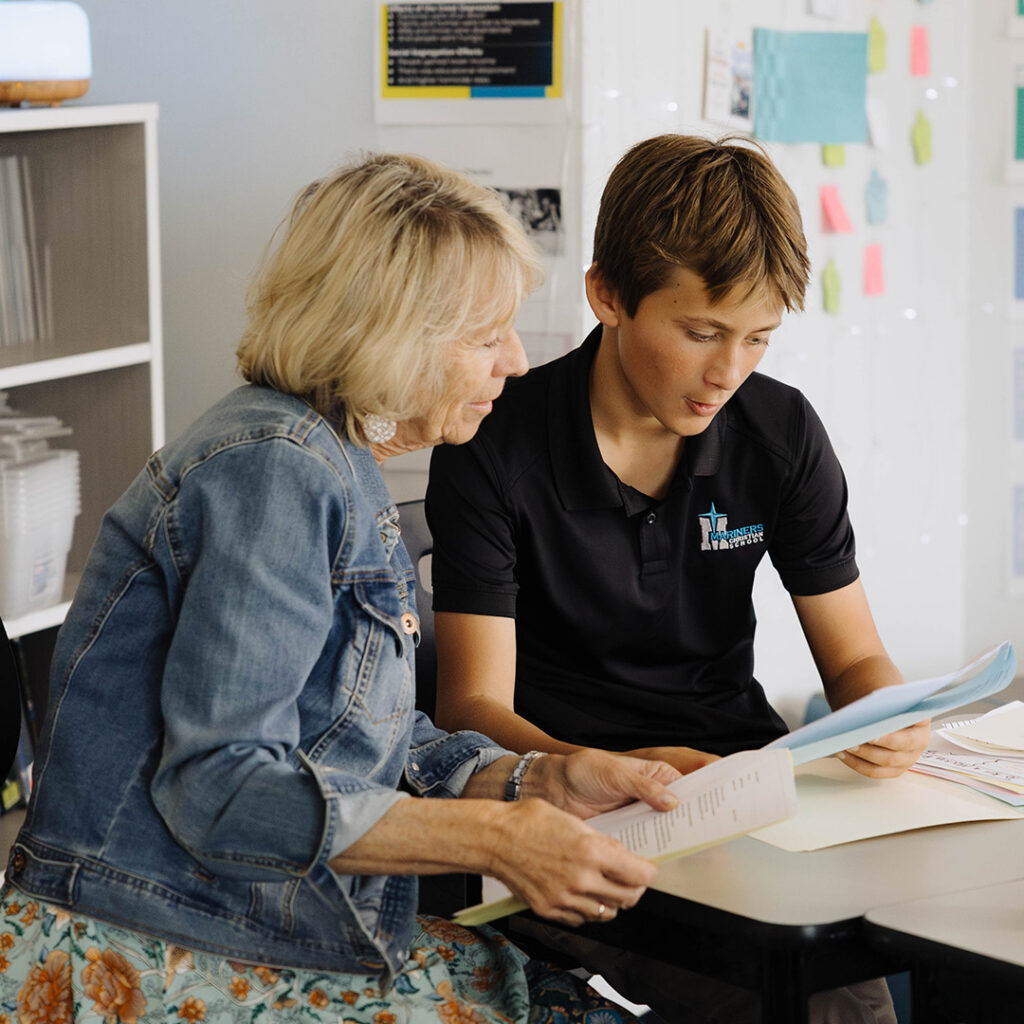
6th Grade
In 6th grade English Language Arts, scholars dig beneath the basic plot of a story or text to find patterns, themes, perspectives, and application to life outside the classroom. They often respond to what they read both through discussion and in writing. Inclusion of text evidence strengthens student writing. To add depth and clarity to their writing, students incorporate strategies such as sentence patterns for variety. They also work on their grammar, vocabulary, and persuasive writing. Class discussions, presentations, and collaborative activities help students to grow as confident communicators and critical thinkers, preparing them for more advanced language arts study.
7th Grade
In 7th grade English Language Arts, students continue to develop robust writing skills with an increasing use of vivid descriptive words and sentence patterns for effective expression. Through consistent practice, students’ writing skills grow in pace, depth, and volume, with an emphasis on quality over quantity. Various genres of literature are used to teach literary elements so that these skills can be used in any literary work independently as they become stronger readers and ultimately life-long learners. Classroom discussion, questioning, and Socratic seminars offer students the opportunity to listen to peers’ ideas, consider multiple perspectives, and present their own ideas eloquently.
8th Grade
In 8th grade English Language Arts, scholars demonstrate more independence, find their voice in writing, and are able to respond to the varying demands of audience, task, and purpose. Content is used to teach skills such as analyzing the use of figurative language, evaluating multiple perspectives, understanding tone and diction, and recognizing the use of rhetorical devices in literature, nonfiction, speeches, and poetry. Engaging in research, writing, and technology, 8th grade scholars independently complete a capstone writing project as well as a collaborative podcast project. Regular participation in Socratic Seminars allow scholars to explore concepts, deepen their understanding of complex literature, and exchange ideas with an eye toward preparation for high school.
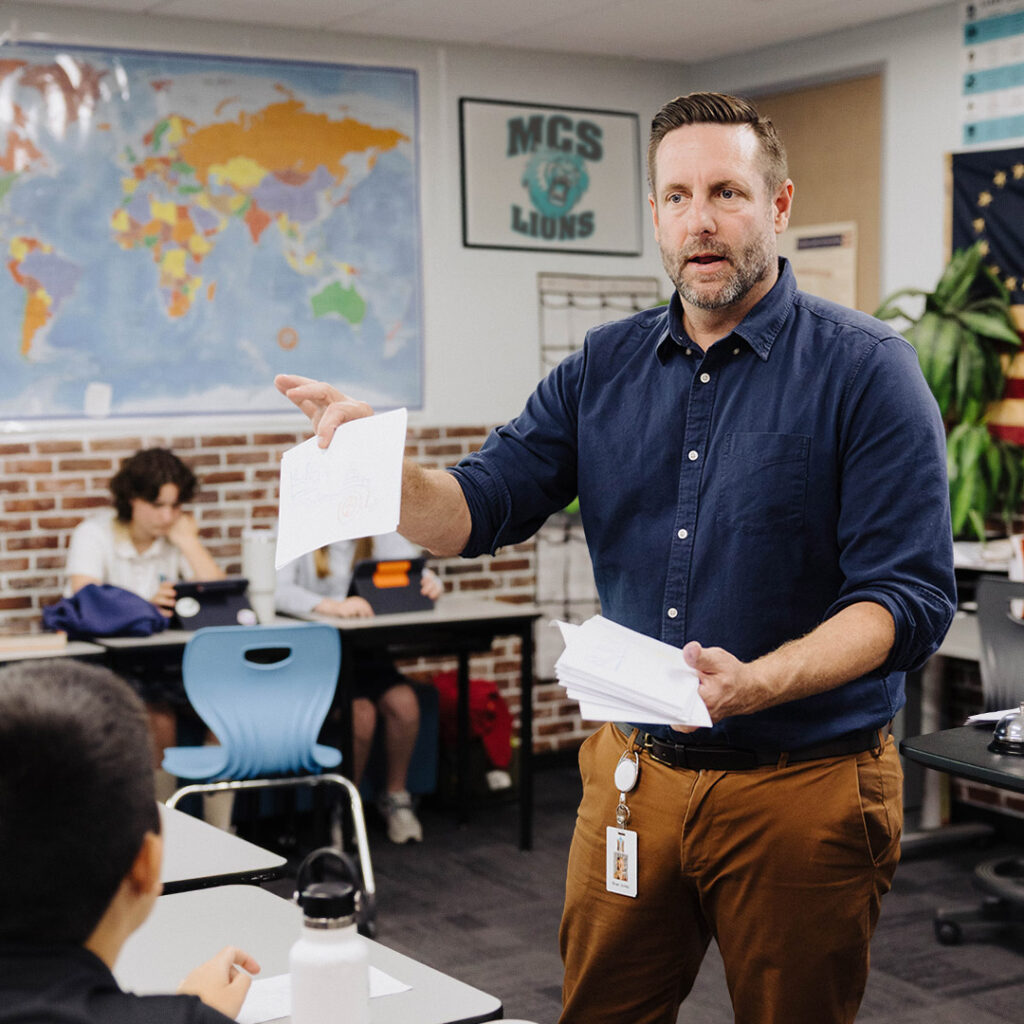
History
Our History program concentrates on developing scholars of the discipline who read, write and think like historians. The department provides students with a comprehensive course of study focused on literacy skills, historical content mastery, inquiry-based learning, and civic responsibility. The program is grounded in the California History-Social Science Framework, a biblical worldview, and research-based instructional practices. Learning is brought to life through interactive curriculum and experiential lessons such as simulations, problem-solving group work, gallery walks, and act-it-outs.
MCS history teachers routinely and explicitly teach the skills of sourcing and provide opportunities to practice them through History Mysteries (investigative source analysis) and DBQs (Document-Based Questions). Socratic seminars and debates require students to analyze primary and secondary sources, evaluate their importance, and defend a position. History teachers also have been known from time to time to teach in full costume and character. Don’t be surprised if you see George Washington, Cleopatra, or Queen Elizabeth roaming the halls!
6th Grade
Sixth grade students will discover how the Neolithic and Agricultural Revolutions led to the emergence of ancient civilizations in Mesopotamia, Egypt, ancient Israel, China, India, Greece and Rome. The students experience Ancient Greek and Roman art and architecture through a field trip to the Getty Villa in Malibu.
7th Grade
Seventh grade students explore the medieval through early modern periods of world history with a focus on the rise and fall of empires, the development of religions and languages, and movements of people, ideas, and goods. Students experience world history beyond the classroom with a field trip to the Getty Center in Los Angeles.
8th Grade
8th grade students will dive deep into the history of the United States from the establishment of the original British colonies to the Industrial Revolution with a focus on the Constitution and how our government works. In the Fall, 8th graders spend a life-changing week in Washington, D.C. and Philadelphia, visiting the significant places and memorials of the people who have helped to establish and shape our great nation.
Mathematics
We develop mathematicians through focus, coherence, and rigor. The attention to rigor reflects the balance of conceptual understanding, procedural skill and fluency, and application. Our program is a standards-based hybrid program, based on Common Core math standards.
We encourage students to experience a productive struggle and persevere as they tackle their work throughout the school year. We welcome mistakes as they are a springboard to learning opportunities. Math is about the process, just like our faith. God’s purpose is the process itself. We love what Oswald Chambers shares with us in His Utmost for His Highest: “The question of whether or not we arrive at a particular goal is of little importance, and reaching it becomes merely an episode along the way. What we see as only the process of reaching a particular end, God sees as the goal itself.”
Savvas Realize is the award-winning digital platform used across all grade levels. This is a rigorous, supportive, and engaging learning management system that gives students the ability to take control of their own learning.
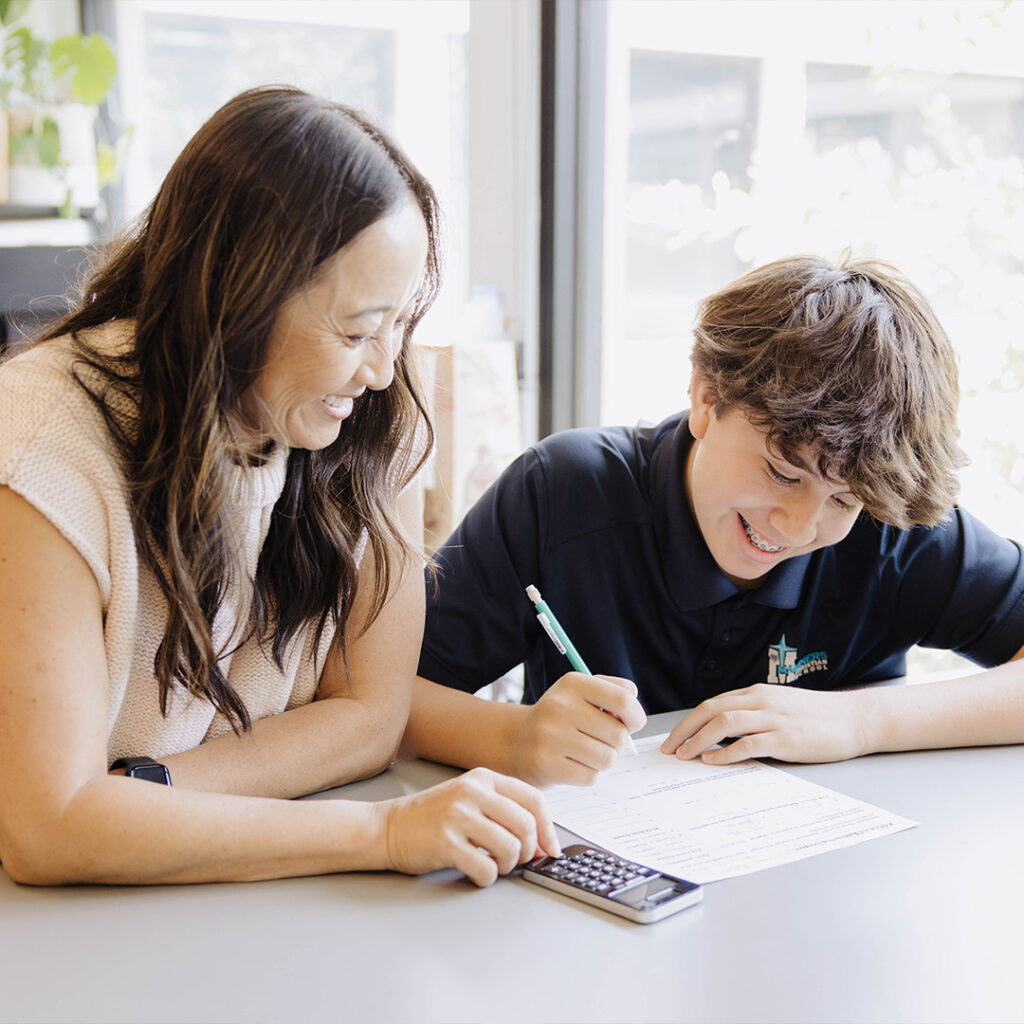
6th Grade
Math 6: Instruction focuses on 7 critical areas: (1) understand ratio concepts and use ratio reasoning to solve problems; (2) apply and extend previous understandings of multiplication and division to divide fractions by fractions; (3) apply and extend previous understandings of numbers to the system of rational numbers; (4) apply and extend previous understandings of arithmetic to algebraic expressions; (5) reason about and solve one-variable equations and inequalities; (6) represent and analyze quantitative relationships between dependent and independent variables; and (7) solve real-world and mathematical problems involving area, surface area, and volume.
7th Grade
Math 7 Instruction focuses on four critical areas: (1) apply and extend previous understanding of operations with fractions to add, subtract, multiply, and divide rational numbers; (2) analyze proportional relationships and use them to solve real-world and mathematical problems; (3) use properties of operations to generate equivalent expressions; and (4) solve real life and mathematical problems using numerical and algebraic expressions and equations.
Pre-Algebra Instruction focuses on four critical areas in Math 7 as well as these other five areas: (1) apply the Pythagorean Theorem to determine unknown side lengths in right triangles in real-world and mathematical problems in two and three dimensions; (2) draw, construct, and describe geometric figures and describe the relationships between them; (3) volumes of cones, cylinders, spears and use them to solve real-world and mathematical problems; (4) expressions and equations works with radicals and integer exponents, (5) define, evaluate, and compare functions.
8th Grade
Math 8 Instruction focuses on five critical areas: (1) working with numbers that are rational and irrational, with an introduction to radicals and integer and rational exponents, (2) analyze and solve linear equations in one variable and systems of linear equations, (3) understand the connection between linear equations in two variables, proportional relationships, and lines, (4) Understand congruence and similarity by applying rigid motions in the coordinate plane and use the Pythagorean Theorem to analyze right triangles, and (5) Solve real-world and mathematical problems involving volume of cylinders, cones and spheres.
Algebra I: The main purpose of Algebra I is to develop students’ fluency with linear, quadratic, and exponential functions. The critical areas of instruction involve deepening and extending students’ understanding of linear and non-linear relationships by comparing and contrasting those relationships and by applying linear models to data that exhibit a linear trend. In addition, students engage in methods for analyzing, solving, and using exponential and quadratic functions. Some of the overarching elements of the Algebra I course include the notion of function, solving equations and systems of equations, linear and non-linear patterns, and graphs as representations of functions.
Geometry
Geometry instruction focuses on six critical areas: (1) experiment with transformations in the plane; (2) understand congruence in terms of rigid motions; (3) prove geometric theorems; (4) understand solidarity in terms of similar transformations; (5) define trigonometric ratios and solve problems involving right angles; (6) understand and apply theorems about circles.
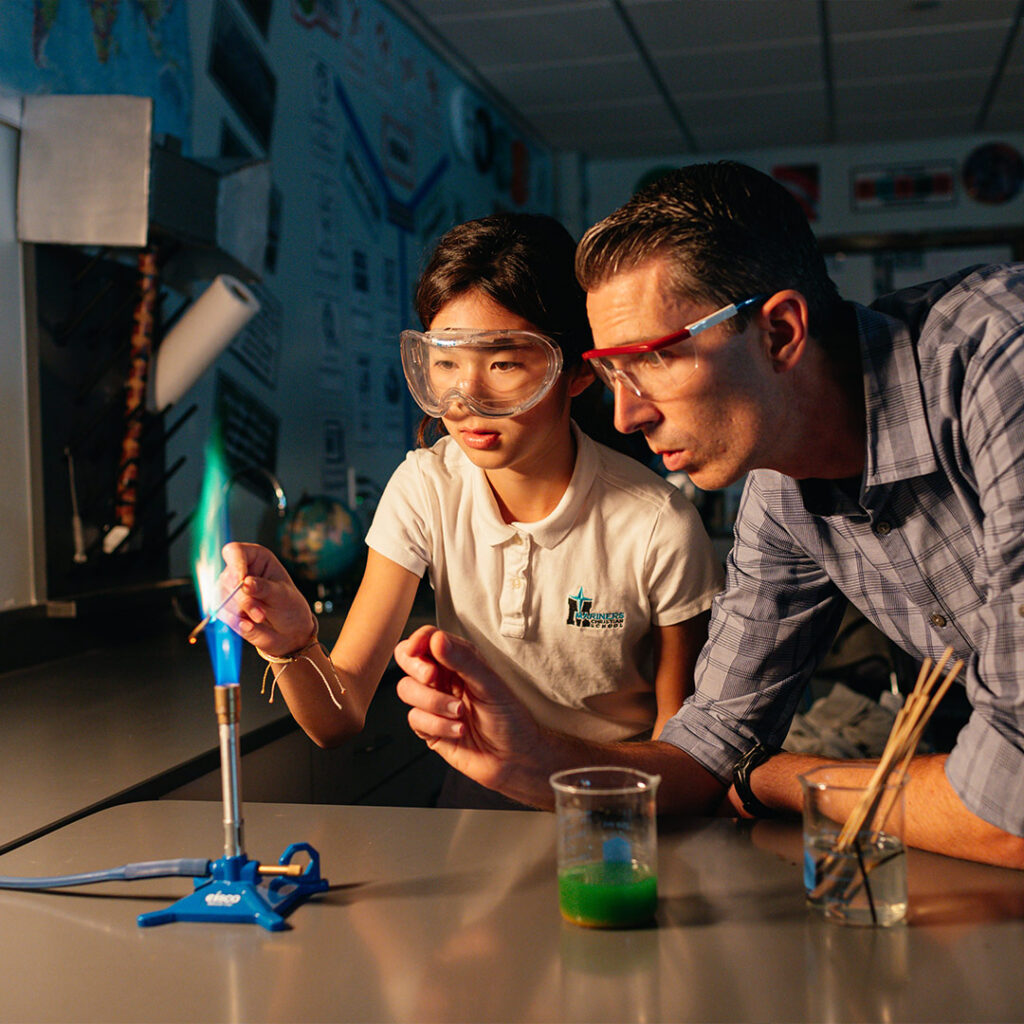
Science
Middle School students are led in phenomenon-based instruction emphasizing the 8 Next Generation Science Standards Practices in order to develop science scholars with skills to think scientifically about the real world. Scholars are provided with many hands-on and collaborative learning opportunities through research, experiments, dissections, inquiry-based projects, and engineering challenges. The science program includes all of the Disciplinary Core Ideas (DCI’s) of the Next Generation Science Standards and is taught from a distinctly Christian worldview.
To emphasize science in the real world, students participate in a 4-day outdoor education science camp in 6th grade and an environmental clean up during 7th grade community service week.
6th Grade
In 6th grade, students explore Earth science emphasizing plate tectonics, shaping of earth’s surface, energy and earth’s systems, weather and climate, as well as ecology and natural resources. Throughout the year, the theme verse, “Jesus Christ is the same today, yesterday, and forever” Hebrews 13:8 emphasizes God’s consistent nature shown through the many dynamic cycles studied throughout the year.
7th Grade
In 7th grade, students explore Life Science emphasizing light, cell structure and processes, genetics and heredity, creation and evolution, and human body systems. This allows students to see God’s intentionality in design from the smallest unit of life to the vastness of the sun and the energy it provides. The consistency in His incredible design reminds us of His consistency in our ever changing world.
8th Grade
In 8th grade, students explore Physical Science. The study begins with a focus on Chemistry including basic terminology, chemical formulas, and the periodic table. In this unit, students are provided foundational knowledge in the areas biochemistry and biology. Content studies continue with a focus on Physics including motion, energy, forces, and Newton’s Laws. Astronomy is integrated within the context of Chemistry and Physics which culminates in a year-long Mariners Agency for Space Exploration and Colonization (M.A.S.E.C) Project applying the content and skills learned across the year. Biblical integration focuses on God’s creation and all He has designed, from the smallest to the largest known things including all of the forces and processes that hold them all together.
Spanish
This course is an interactive, blended course that is paced to complete Spanish I by the end of the 8th grade year. Students immerse themselves in the vibrant and beautiful Spanish language and culture to develop fluency and literacy. In addition to acquiring reading, writing, listening, and speaking skills in the Spanish language, students will also be provided learning experiences including hands-on projects, cultural activities, exposure to Spanish literature and art, and real life opportunities to use the language through exciting field trips! Note: Unless specified by a parent, 7th and 8th grade students are automatically enrolled in a Spanish course which takes the place of an elective choice.
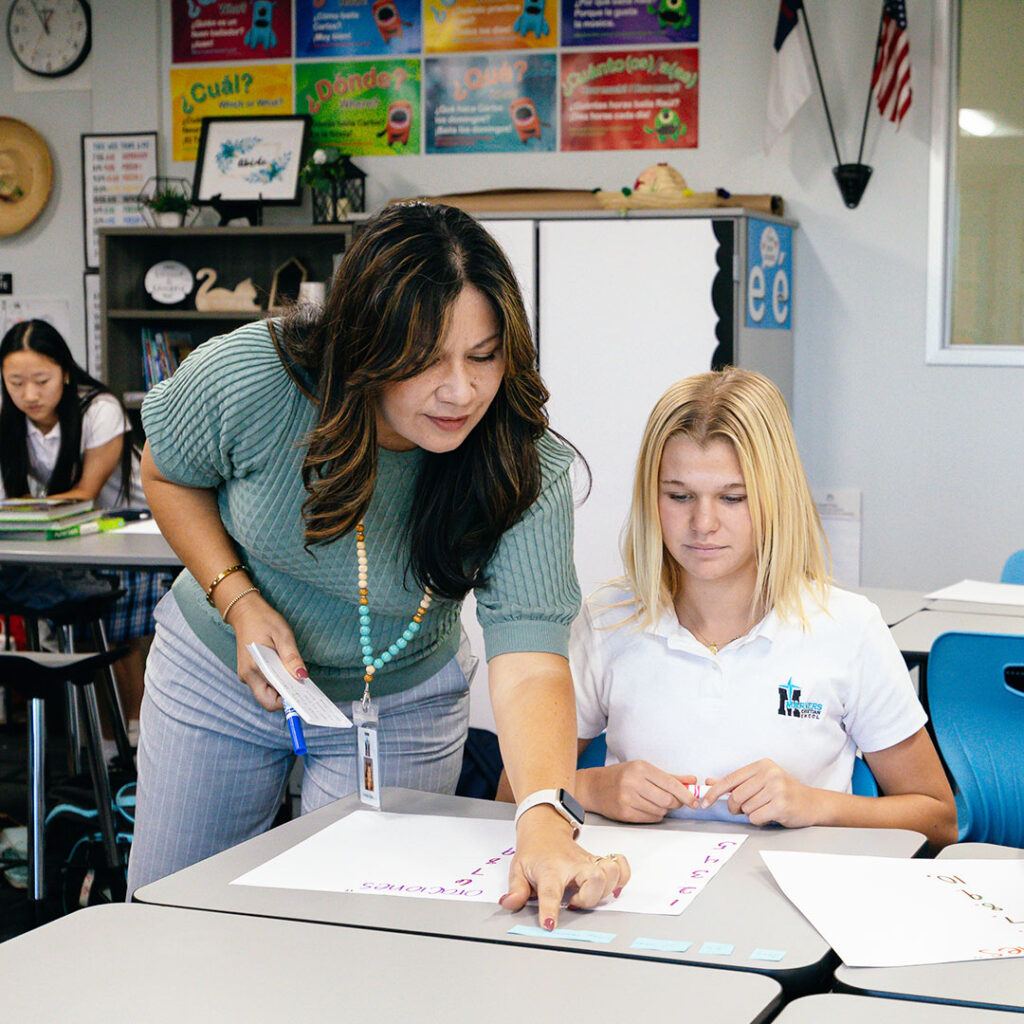
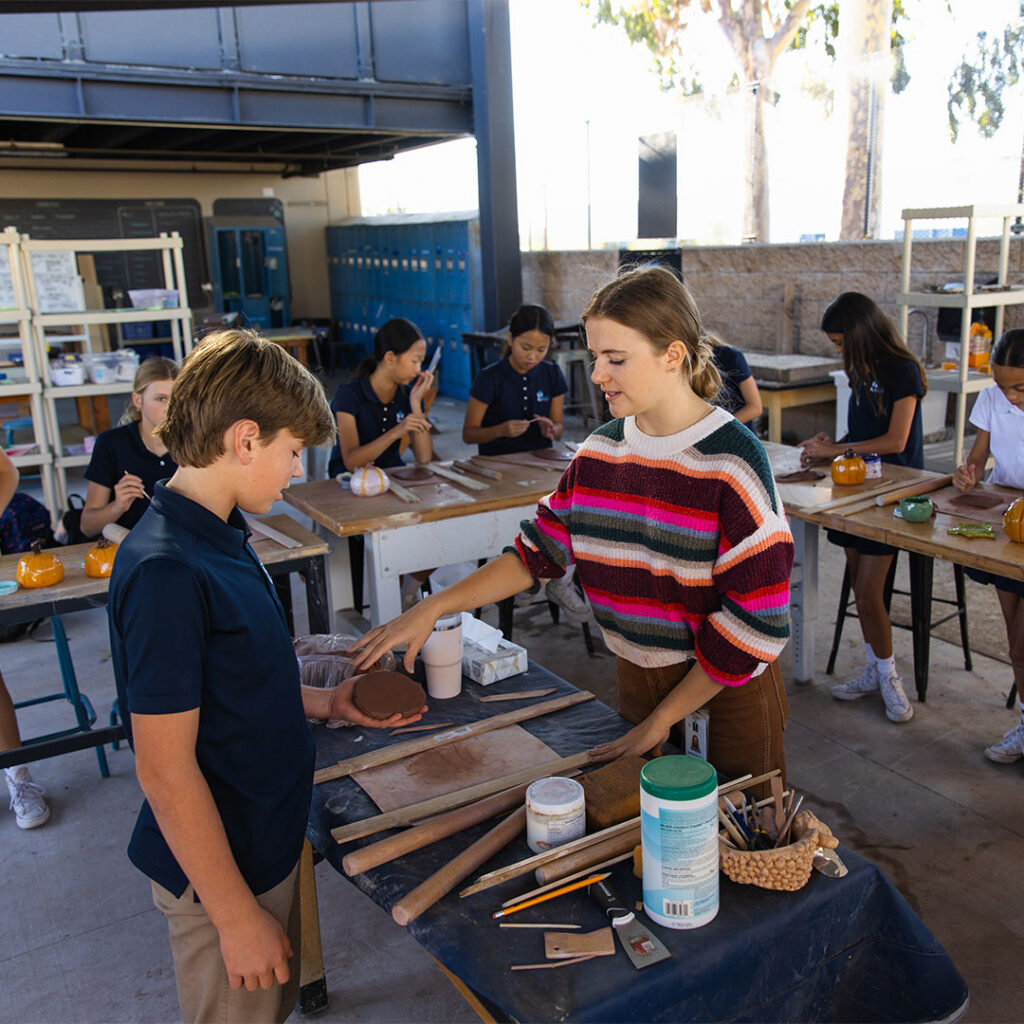
Electives
At MCS two of our core values are Whole-Child Focus and Innovation. We seek to ensure our electives are created with these values at the core allowing students to explore new experiences and grow in the gifts God has uniquely given each student.
MCS endeavors to place students in their preferred elective selections. However, it is important to note some classes are restricted by grade level, size, or placement requirements. Therefore, all student selections are not guaranteed.
Mariners Academy of Arts (Year-Long Courses)
- Concert Band
- Concert Choir/Show Choir
- String Orchestra
- Theater Intro/Theater Intermediate/Theater Advanced/Theater Tech & Design
- Visual Arts
Performing Arts
- Beginning Band
- Choir
- Introduction to Theater
- Theater-Intermediate Acting & Musical Theater
- Theater-Advanced Acting & Musical Theater
- Theater-Improv
- Theater Production and Design
- Guitar Ensemble
- Percussion Ensemble
- Piano Lab
- String Beginning Orchestra
Visual Arts
- Arts Foundations
- Art I, Art II, Art III *Prerequisite
- Ceramics I ~
- Ceramics II * ~
- Photography
- Woodworking ~
- Yearbook ~ (yearlong course)
Innovation
- Broadcast Media
- Design Squad I
- Design Squad II *
- Digital Media Design
- Money & Mission
- Web Design
Languages
- Spanish Ia
- Spanish Ib *
- Spanish Ic *
- Spanish Id*
- Spanish Ie*
General
- ASB ~ * (voted into office)
- Creative Writing
- Culinary Arts & Nutrition ~
- Faith in Film~
- Faith in Music
- Gardening
- Sewing Design
- Speech & Debate~
- Peer Assistance Leadership (PAL)
*Indicates a course with a prerequisite.
~Indicates a course available to 7th and/or 8th grade only.
Educational Technology
Educational technology is just one of the many tools that will be used to continually develop MCS students into strong digital age learners and prepare them to be college and career ready.
Therefore, it is the goal of MCS to train students in the wise and appropriate use of digital devices and social media, ensure the privacy rights of all students, maintain academic integrity, and limit disruptions to the learning environment.
Initial Educational Technology instruction is provided in the Elementary Technology and Middle School Educational Technology classes by our Digital Learning Coaches for both the Elementary and Middle School level. These coaches support our classroom teachers with technology integration in their curriculum across all grades and content. Our technology integration will not supplant the teacher or the human interaction that is so essential for learning; it is intended for use as a tool to enhance learning for all children.
Every middle school student and teaching faculty member utilizes an 1:1 device (Apple iPad) at MCS, which enhances student learning and the overall educational experience to prepare students for high school and beyond. 1:1 devices enhance student ownership, engagement, and hands-on learning.
